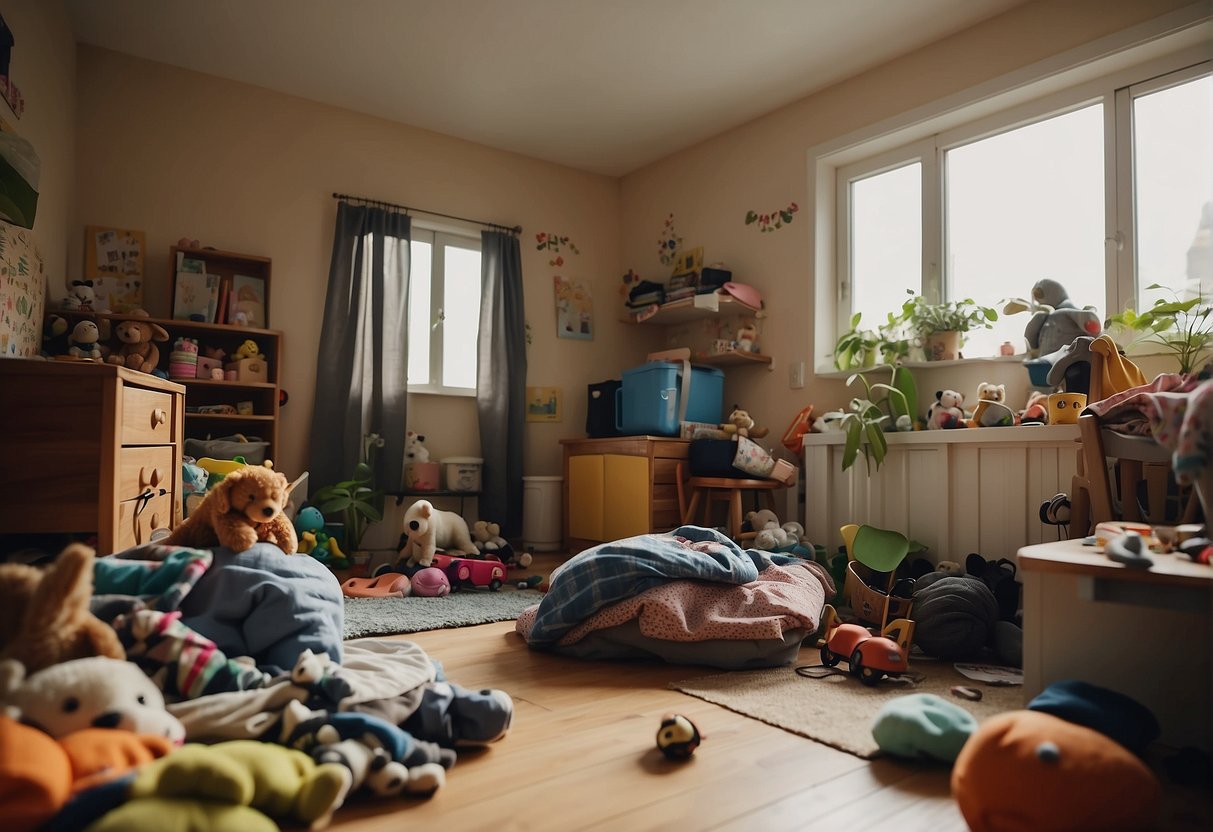It’s a heartbreaking experience for any parent when their child appears to be distant or uncaring. Parents often wonder what they did wrong and what they can do to fix the situation. While it’s natural to feel this way, it’s important to understand that there are many reasons why a child may not appear to care about their parent. In this article, we will explore some of the common reasons why a son may not care about his mother or father and what parents can do to foster a healthy relationship with their child.
One of the primary reasons a child may appear distant or uncaring is the natural developmental changes they undergo. During adolescence, children experience a surge in hormones, which can significantly affect their mood and behavior. This period is also crucial for identity formation, and children may distance themselves from their parents as they try to establish their independence and sense of self. It’s important for parents to understand that this is a normal part of development and not a reflection of their parenting.
Another reason why a child may not appear to care about their parent is due to neglect or abuse. In some cases, children may distance themselves from their parents as a way of protecting themselves from further harm. If a child has experienced neglect or abuse, it’s essential to seek professional help to address the underlying issues and work towards healing. It’s also important for parents to take responsibility for their actions and work towards rebuilding trust with their child.
Key Takeaways
- Understanding your child’s behavior and the reasons why they may appear distant or uncaring is crucial for fostering a healthy relationship.
- Communication and building trust are essential for repairing relationships that have been damaged by neglect or abuse.
- Seeking professional help is necessary in cases of neglect or abuse, and parents must take responsibility for their actions and work towards rebuilding trust.
Understanding Your Child’s Behavior
When a parent feels that their child doesn’t care about them, it can be a heartbreaking and frustrating experience. However, it’s important to recognize that this feeling is not uncommon and that there are many factors that can contribute to this dynamic. Understanding your child’s behavior can help you navigate this difficult situation and work towards building a stronger relationship.
Signs of Emotional Distance
One of the key signs of emotional distance is a lack of empathy. If your child seems self-centered or indifferent to your feelings, it may be a sign that they are emotionally distant. Other signs may include a lack of communication or interest in spending time with you.
Adolescence and Independence
Teenagers are often motivated to assert their independence and establish their own identities. This can lead to a distancing from parents and family members as they seek to establish their own sense of self. It’s important to recognize that this is a normal part of adolescence and not necessarily a reflection of your relationship with your child.
Family Dynamics and Parental Authority
Family dynamics and parental authority can also contribute to feelings of emotional distance. If your child feels like they are not being heard or respected, they may distance themselves from you. It’s important to establish clear boundaries and expectations while also being willing to listen to your child’s perspective and concerns.
In conclusion, while it can be difficult to navigate a relationship with a child who seems to not care about you, it’s important to remember that this is often a complex issue with many contributing factors. By understanding your child’s behavior and working to establish a healthy relationship, you can build a stronger bond and create a more positive family dynamic.
Communication and Building Trust
Having a healthy and open communication with one’s child is vital in building a strong and lasting relationship. Effective conversational techniques can help parents better understand their child’s perspective and create a more supportive environment. Some of these techniques include active listening, asking open-ended questions, and avoiding judgmental language.
Effective Conversational Techniques
Active listening is a crucial component of effective communication. This technique involves focusing on what the child is saying and responding in a way that shows they have been heard. Parents can also ask open-ended questions to encourage their child to express their thoughts and feelings. This approach can help parents better understand their child’s perspective and build a stronger connection.
Understanding Love Languages
Understanding one’s child’s love language can help parents better engage with them. Love languages refer to the different ways that people express and receive love. These include physical touch, words of affirmation, quality time, acts of service, and receiving gifts. Parents can use this knowledge to tailor their interactions with their child to better meet their needs.
Setting Healthy Boundaries
Setting healthy boundaries is an essential part of building trust with one’s child. Boundaries help children feel safe and secure and can help parents establish clear expectations for behavior. Parents should communicate these boundaries clearly and consistently and be willing to enforce them when necessary. This approach can help children develop a sense of responsibility and respect for others.
In summary, building a strong and lasting relationship with one’s child requires effective communication, understanding of love languages, and setting healthy boundaries. By following these techniques, parents can create a supportive and engaging environment that fosters a positive attitude and trust.
Dealing With Neglect and Abuse
Neglect and abuse can have long-lasting effects on a person’s mental and physical health. It is important to identify and address these issues as soon as possible.
Identifying Toxic Family Environments
Toxic family environments can be difficult to identify, as they can manifest in different ways. Some signs of a toxic family environment include:
- Lack of emotional support or validation
- Constant criticism or belittling
- Physical or emotional abuse
- Neglect or disregard for basic needs
- Enabling or encouraging harmful behaviors
If a person is experiencing any of these signs, it may be a sign of a toxic family environment. It is important to seek help and support from trusted friends, family members, or professionals.
Consequences of Neglect and Abuse
Neglect and abuse can have serious consequences on a person’s mental and physical health. Some consequences of neglect and abuse include:
- Depression and anxiety
- Low self-esteem and self-worth
- Substance abuse and addiction
- Physical health problems
- Difficulty forming healthy relationships
It is important for individuals who have experienced neglect and abuse to seek professional help and support. Therapy, support groups, and other resources can help individuals heal and move forward from their experiences.
In conclusion, neglect and abuse can have serious consequences on a person’s well-being. It is important to identify and address these issues as soon as possible, and seek help and support from trusted individuals and professionals.
Seeking Professional Help
When a parent feels that their child doesn’t care about them, it can be a heartbreaking and frustrating experience. It’s important to recognize that this feeling is not uncommon and that there are many factors that can contribute to this dynamic. Seeking professional help can be an effective way to address these issues.
When to Consult a Therapist
If a parent feels that their child’s behavior is negatively affecting their relationship, it may be time to consider consulting a therapist. According to Verywell Family, some general warning signs that may indicate a need for professional help include:
- Persistent behavioral problems
- Difficulty with transitions
- Extreme mood swings
- Social withdrawal
- Poor academic performance
If a child exhibits any of these behaviors, it may be helpful to consult a therapist. A mental health professional can help the child and parent work through their issues and develop strategies to improve their relationship.
Counseling for Parents and Children
Counseling can be beneficial for both parents and children. A therapist can help parents understand their child’s behavior and develop strategies to improve communication and strengthen their relationship. Additionally, a therapist can help children learn coping skills and develop healthy ways to express their emotions.
It’s important to find a therapist who specializes in working with families. A family therapist can help the parent and child work together to address their issues. They can also help the family develop strategies to improve their communication and strengthen their bond.
In conclusion, seeking professional help can be an effective way to address issues related to a child’s behavior and a parent’s feelings of disconnect. By consulting a therapist, parents and children can work together to improve their relationship and develop healthy ways to express their emotions.
Fostering Responsibility and Respect
When a parent feels that their child doesn’t care about them, it can be a heartbreaking and frustrating experience. However, it’s important to recognize that there are many factors that can contribute to this dynamic, and that there are steps parents can take to improve their relationship with their child.
Teaching Accountability
One way parents can foster responsibility in their child is by teaching them accountability. This means setting clear rules and limits, and holding their child responsible when they break them. By doing so, parents can help their child understand that their actions have consequences, and that they need to take responsibility for their behavior.
To teach accountability, parents can create a list of rules and consequences and review them with their child. They can also encourage their child to set goals and work towards them, and celebrate their accomplishments when they achieve them.
Encouraging Respectful Behavior
Another important aspect of fostering a healthy relationship with a child is encouraging respectful behavior. This means modeling respectful behavior towards the child, as well as towards others.
Parents can also set clear expectations for respectful behavior, and hold their child accountable when they are disrespectful. This can include consequences such as loss of privileges or time-outs.
It’s important to note that fostering responsibility and respect is an ongoing process, and that it may take time to see results. However, by setting clear rules and limits, holding their child accountable, and modeling respectful behavior, parents can create a positive and healthy relationship with their child.
Frequently Asked Questions
How can I cope with the feeling that my child doesn’t love me?
It’s normal to feel hurt and rejected when your child seems distant or uninterested in your relationship. However, it’s essential to remember that your child’s behavior is not a reflection of your worth as a parent. Some strategies that may help you cope with these feelings include seeking support from friends or family members, practicing self-care, and focusing on other meaningful relationships in your life.
What are the signs that my child is emotionally distancing themselves?
Some common signs that your child may be emotionally distancing themselves include avoiding communication or spending time with you, expressing disinterest or indifference towards your life events or opinions, and failing to reciprocate affection or support. However, it’s important to keep in mind that these behaviors may also be indicative of other factors, such as stress, depression, or relationship issues.
How should I address my grown child’s disrespectful behavior?
It’s essential to approach your child’s disrespectful behavior with empathy and understanding. Try to communicate your concerns calmly and respectfully, without resorting to blame or criticism. You may also want to set clear boundaries and consequences for disrespectful behavior, such as limiting contact or refusing to engage in arguments.
What strategies can I use to improve my relationship with my distant son?
Improving your relationship with a distant son may take time and effort, but it’s possible. Some strategies that may help include actively listening to your son’s concerns and opinions, expressing appreciation and gratitude for his positive qualities and actions, and finding common interests or activities that you can enjoy together.
Why does my adult child only reach out to me when they need something?
While it’s natural to feel frustrated or used when your adult child only contacts you when they need something, it’s important to remember that this behavior may stem from a variety of factors, such as busyness, forgetfulness, or a lack of understanding of your needs and feelings. Try to communicate your concerns with your child calmly and respectfully, and work together to find ways to strengthen your relationship.
How can I manage my disappointment in my child’s apparent lack of care?
Managing disappointment in your child’s behavior can be challenging, but it’s important to focus on constructive ways to address the issue. Some strategies that may help include seeking support from others, practicing self-care, and working with your child to identify areas where you can improve your relationship. Remember that change takes time, and it’s essential to approach the situation with patience and understanding.

My name is Laura, and as a mother of two, I understand firsthand the joys and challenges of raising a child. That’s why I created this website, to provide a comprehensive and trustworthy source of information and support for new and expectant parents.






